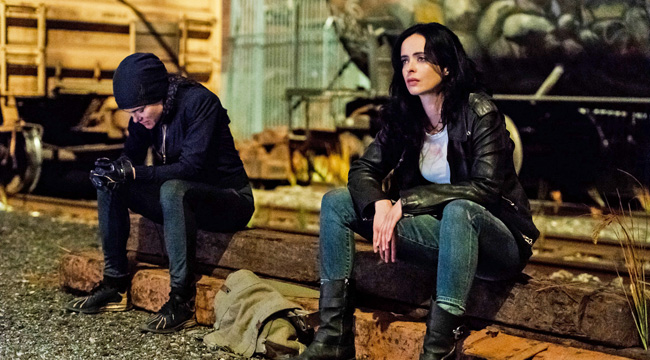
Pour one out for Jessica Jones, the hard-boozing, superpowered, misanthropic P.I. (with the great jeans), who not only feels the pressure of ending her own series but being the last of The Defenders to say goodbye for now. And for how long? Well, those characters may eventually surface on Disney’s streaming service, but there’s no guarantee of that happening. With this third season starring Krysten Ritter, Netflix puts an end to their MCU era with a baker’s dozen of episodes that, at once, attempt to branch off into a refreshing new direction but also finds their purpose frustrated. Instead of a bang-up season, Jessica Jones drowns in a tired, overplayed question: What does it mean to be a hero?
Aaand that’s a theme that’s been pounded into the ground already by several superhero movies (the most similar take here would be Captain America: Civil War), and Jessica Jones dwells on that question for the season’s first eight episodes screened for review. If an inventive answer surfaces during the final five chapters, then it will have happened too late. This season succumbs to the dreaded bloat that the Netflix MCU adores — too many episodes, all around an hour long, against the developing trend for the best series this year (including Netflix’s Russian Doll and Black Summer) of shorter being better. With over 500 original shows airing in any given year, the time for brevity is now.
This season, the biggest instance of padding happens to be the one being heavily marketed — the transformation of Jessica’s adoptive sister, Trish (Rachael Taylor), into the streaming service’s version of Hellcat. She’s sarcastically described by Jessica as a “cat burglar,” since her budding vigilantism involves leaping out of windows several stories up, but goodness, there’s a lot of time wasted on Trish without much payoff. Her bottle episode, directed by Ritter, gives her an origin story and works well on its own. As far as integrating Trish as a hero into the main narrative, though, the process doesn’t feel smooth. Yes, there’s a nice sisterhood theme at work when Trish and Jessica both work together to stop a new villain, but other than that, she slows the series down. It feels like a chore, as a viewer, to slog through the process of accepting sort-of Hellcat while this show takes a bow.

That’s the gist of this final round, which is tragic because the production was underway while other Netflix Marvel series, one by one, received cancellation papers. The end result is the realization that Jessica Jones attempted to continue its established pattern of being the most nuanced of all these offerings, although it no longer matters, and that message gets lost in too many subplots. Still, the show’s tone has never wavered, even if the second season struggled to right itself after Jones defeated Kilgrave (played to perfection by David Tennant), the villain who was heavily rooted within the comics and symbolized psychological abuse, gaslighting, and rape culture. The later arrival of Jessica’s not-dead-after-all mother wasn’t as compelling but served as enough lingering trauma to push Jones to her third-season starting point.
This was a promising juncture, with Jessica finally able to put the past fully in the past and attempt to look toward the future. And the new villain (Jeremy Bobbs, even skeevier than he was in Russian Doll) who Jessica must confront is a fascinating breed and feels like an appropriate progression for this series. He’s a serial killer, one who attempts to build a following in the media. He embodies the soul of every MRA who’s raging against women who refuse to cower in the face of danger. This, as Jessica phrases it, offends his “fragile sense of masculinity.” Their interplay in moments like these is sheer fun to witness, and this new adversarial dynamic could have gone somewhere, especially with the show playing up its noir aspects. It’s also fleetingly thrilling to see a series hint at commentary on how pop culture idolizes serial killers — a phenomenon that was recently on display at Netflix. As you’ll recall, the streaming service asked viewers to stop lusting after Ted Bundy before going on to acquire the Zac Efron-starring biopic that paints him as a heartthrob.
Unfortunately, those efforts drown in a season that heavily leans into Trish, rather than fleshing out more of what’s happening with characters like Jeri Hogarth (Carrie-Anne Moss), who’s still terrifyingly manipulative but more desperate on both professional and personal levels, as she confronts the specter of death at any given moment. Not to mention the fact that Malcolm (Eka Darville) has switched from Team Jessica to Team Jeri, and he’s wrestling with the selling of his soul in the process. Those two deserve more screentime, but instead, they’re floating around almost aimlessly with scattered check-in times. Also a shame? The season contains many sharply funny moments, like Jessica at the beach in her standard “uniform” of leather and jeans, going viral after hero-ing out before a grumpy client calls her a “third-rate Joan Jett.” Then we see the classic Krysten Ritter expression that works so well for Jessica Jones, who has had enough of this sh*t. Sadly, the series feels that way as well while Jessica Jones puts the Netflix MCU era out of its misery.
Netflix’s final ‘Jessica Jones’ season arrives on June 14.
